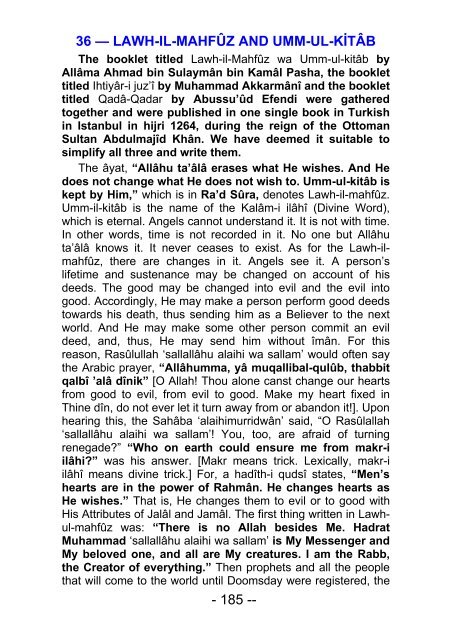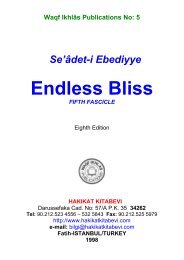3-Endless Bliss Third Fascicle - Hakikat Kitabevi
3-Endless Bliss Third Fascicle - Hakikat Kitabevi
3-Endless Bliss Third Fascicle - Hakikat Kitabevi
Create successful ePaper yourself
Turn your PDF publications into a flip-book with our unique Google optimized e-Paper software.
36 — LAWH-IL-MAHFÛZ AND UMM-UL-KİTÂB<br />
The booklet titled Lawh-il-Mahfûz wa Umm-ul-kitâb by<br />
Allâma Ahmad bin Sulaymân bin Kamâl Pasha, the booklet<br />
titled Ihtiyâr-i juz’î by Muhammad Akkarmânî and the booklet<br />
titled Qadâ-Qadar by Abussu’ûd Efendi were gathered<br />
together and were published in one single book in Turkish<br />
in Istanbul in hijri 1264, during the reign of the Ottoman<br />
Sultan Abdulmajîd Khân. We have deemed it suitable to<br />
simplify all three and write them.<br />
The âyat, “Allâhu ta’âlâ erases what He wishes. And He<br />
does not change what He does not wish to. Umm-ul-kitâb is<br />
kept by Him,” which is in Ra’d Sûra, denotes Lawh-il-mahfûz.<br />
Umm-il-kitâb is the name of the Kalâm-i ilâhî (Divine Word),<br />
which is eternal. Angels cannot understand it. It is not with time.<br />
In other words, time is not recorded in it. No one but Allâhu<br />
ta’âlâ knows it. It never ceases to exist. As for the Lawh-ilmahfûz,<br />
there are changes in it. Angels see it. A person’s<br />
lifetime and sustenance may be changed on account of his<br />
deeds. The good may be changed into evil and the evil into<br />
good. Accordingly, He may make a person perform good deeds<br />
towards his death, thus sending him as a Believer to the next<br />
world. And He may make some other person commit an evil<br />
deed, and, thus, He may send him without îmân. For this<br />
reason, Rasûlullah ‘sallallâhu alaihi wa sallam’ would often say<br />
the Arabic prayer, “Allâhumma, yâ muqallibal-qulûb, thabbit<br />
qalbî ’alâ dînik” [O Allah! Thou alone canst change our hearts<br />
from good to evil, from evil to good. Make my heart fixed in<br />
Thine dîn, do not ever let it turn away from or abandon it!]. Upon<br />
hearing this, the Sahâba ‘alaihimurridwân’ said, “O Rasûlallah<br />
‘sallallâhu alaihi wa sallam’! You, too, are afraid of turning<br />
renegade?” “Who on earth could ensure me from makr-i<br />
ilâhi?” was his answer. [Makr means trick. Lexically, makr-i<br />
ilâhî means divine trick.] For, a hadîth-i qudsî states, “Men’s<br />
hearts are in the power of Rahmân. He changes hearts as<br />
He wishes.” That is, He changes them to evil or to good with<br />
His Attributes of Jalâl and Jamâl. The first thing written in Lawhul-mahfûz<br />
was: “There is no Allah besides Me. Hadrat<br />
Muhammad ‘sallallâhu alaihi wa sallam’ is My Messenger and<br />
My beloved one, and all are My creatures. I am the Rabb,<br />
the Creator of everything.” Then prophets and all the people<br />
that will come to the world until Doomsday were registered, the<br />
- 185 --











